You searched for: quote
<< Previous | Displaying results 1-10 of 22 for "quote" | Next >>
-
Thomas Buergenthal discusses quote from Abel Herzberg
Oral History"There were not six million Jews murdered; there was one murder, six million times."Holocaust survivor Abel Herzberg Judge Thomas Buergenthal was one of the youngest survivors of the Auschwitz and Sachsenhausen concentration camps. He immigrated to the United States at the age of 17. Judge Buergenthal devoted his life to international and human rights law. He served as chairman of the United States Holocaust Memorial Museum’s Committee on Conscience; was named the Lobingier Professor of Comparative Law…
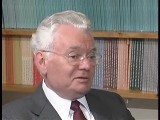
-
Auschwitz fence posts and Elie Wiesel quote on display at the United States Holocaust Memorial Museum
PhotoThis photograph shows Auschwitz fence posts and a quote from Elie Wiesel's Night . They are on display in the third floor tower room of the Permanent Exhibition at the United States Holocaust Memorial Museum. "Never shall I forget that night, the first night in camp, which has turned my life into one long night, seven times cursed and seven times sealed. Never shall I forget that smoke. Never shall I forget the little faces of the children, whose bodies I saw turned into wreaths of smoke beneath a silent…
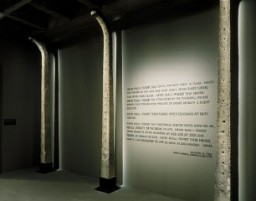
-
Martin Niemöller: "First they came for..."
ArticleLearn about the origins and legacy of Pastor Martin Niemöller's famous postwar words, “First they came for the socialists, and I did not speak out…”
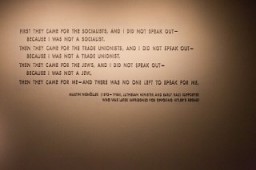
-
Einsatzgruppen trial: US prosecution condemns genocide
FilmAfter the trial of major war criminals before the International Military Tribunal in Nuremberg, the United States held a series of other war crimes trials at Nuremberg—the Subsequent Nuremberg Proceedings. The ninth trial before the American military tribunal in Nuremberg focused on members of the Einsatzgruppen (mobile killing units), who had been assigned to kill Jews and other people behind the eastern front. In this footage of the prosecution's opening statement, US prosecutor Ben Ferencz explains…
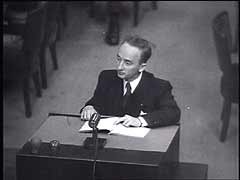
-
The case against defendant Hans Frank
FilmLieutenant Colonel Baldwin of the US prosecution team presents the case against defendant Hans Frank at the Nuremberg trial. Baldwin refers to several of Frank's diary entries about the appropriation of scarce Polish grain for use as food in Germany.
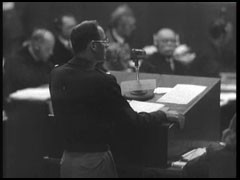
-
Gardelegen
ArticleIn April 1945, US troops encountered a barn on the outskirts of Gardelegen where the SS and its accomplices had massacred over 1,000 concentration camp prisoners.
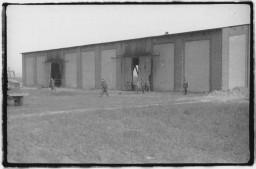
-
Leo Bretholz describes conditions in the Drancy camp
Oral HistoryAfter the Germans annexed Austria in 1938, Leo attempted to flee. He eventually reached Belgium. In 1940 he was deported to the St.-Cyprien camp in France but escaped. In 1942 Leo was smuggled into Switzerland but was arrested and sent back to France, this time to the Rivesaltes and Drancy camps. He and a friend escaped from a train deporting them to Auschwitz in Poland. Leo joined the French underground in 1943. He arrived in the United States in 1947.
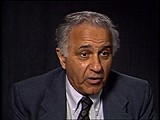
-
Belle Mayer Zeck describes the size and influence of IG Farben
Oral HistoryBelle Mayer trained as a lawyer and worked for the General Counsel of the US Treasury, Foreign Funds Control Bureau. This bureau worked to enforce the Trading With the Enemy Act passed by Congress. In this capacity, Mayer became familiar with the German I. G. Farben chemical company, a large conglomerate that used slave labor during World War II. In 1945, Mayer was sent as a Department of Treasury representative to the postwar London Conference. She was present as representatives from the Allied nations…
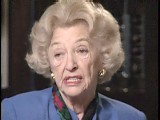
-
Fritzie Weiss Fritzshall describes restrictions placed on Jews in Klucarky
Oral HistoryFritzie's father immigrated to the United States, but by the time he could bring his family over, war had begun and Fritzie's mother feared attacks on transatlantic shipping. Fritzie, her mother, and two brothers were eventually sent to Auschwitz. Her mother and brothers died. Fritzie survived by pretending to be older than her age and thus a stronger worker. On a death march from Auschwitz, Fritzie ran into a forest, where she was later liberated.
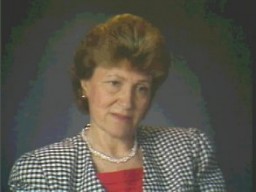
-
Hainewalde
ArticleThe SA established a protective custody camp at Hainewalde in March 1933. Well-known journalist and writer Axel Eggebrecht was among its early prisoners.
